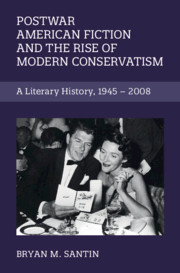Book contents
- Postwar American Fiction and the Rise of Modern Conservatism
- Cambridge Studies in American Literature and Culture
- Postwar American Fiction and the Rise of Modern Conservatism
- Copyright page
- Dedication
- Contents
- Acknowledgments
- Introduction
- Chapter 1 US Literature and the Modern Right at Midcentury
- Chapter 2 The Conservative Movement’s Foundational Fictions
- Chapter 3 The Strongbox of Custom
- Chapter 4 Movement Conservatism, Neoconservatism, and the New Right
- Chapter 5 The American Novel and the Reagan Revolution
- Epilogue: The Curious (Conservative) Case of Marilynne Robinson
- Notes
- Bibliography
- Index
- Cambridge Studies in American Literature and Culture
Chapter 1 - US Literature and the Modern Right at Midcentury
Conservative Modernism, Race, and the Cold War, 1945–1960
Published online by Cambridge University Press: 27 March 2021
- Postwar American Fiction and the Rise of Modern Conservatism
- Cambridge Studies in American Literature and Culture
- Postwar American Fiction and the Rise of Modern Conservatism
- Copyright page
- Dedication
- Contents
- Acknowledgments
- Introduction
- Chapter 1 US Literature and the Modern Right at Midcentury
- Chapter 2 The Conservative Movement’s Foundational Fictions
- Chapter 3 The Strongbox of Custom
- Chapter 4 Movement Conservatism, Neoconservatism, and the New Right
- Chapter 5 The American Novel and the Reagan Revolution
- Epilogue: The Curious (Conservative) Case of Marilynne Robinson
- Notes
- Bibliography
- Index
- Cambridge Studies in American Literature and Culture
Summary
Focusing on the birth of the postwar era to the early 1960s, this chapter reconstructs the widely held critical view that even though New Deal liberalism was the dominant political order in the United States, the most celebrated literature of the period was derived from Anglophone modernism, an aesthetic movement embodied by writers including T. S. Eliot, William Faulkner, and Ezra Pound, whom prominent critics such as Lionel Trilling perceived as anti-liberal at best and reactionary at worst. The chapter also reveals how the correlation between highbrow literature and conservative politics accorded not only with the early conservative movement’s neo-Burkean conception of empirical complexity over abstraction, but also the carefully cultivated self-image conservatives had of themselves as guardians of high literary culture.
Keywords
- Type
- Chapter
- Information
- Postwar American Fiction and the Rise of Modern ConservatismA Literary History, 1945–2008, pp. 24 - 55Publisher: Cambridge University PressPrint publication year: 2021

